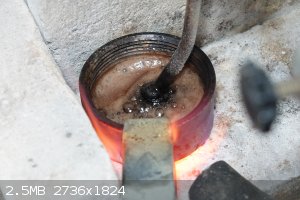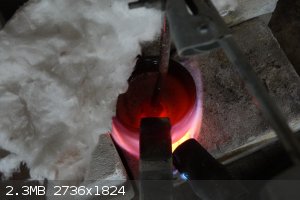metalresearcher
National Hazard
   
Posts: 758
Registered: 7-9-2010
Member Is Offline
Mood: Reactive
|
|
Lithium from Li2CO3 electrolysis ? It failed.
According to the phase diagram Li2CO3 - K2CO3, there is a minimum liquidus of this 'alloy' at 500 C and wt 56% K2CO3. As Li is less electropositive
than K, the Li will be freed rather than the K.
So I mixed 12g Li2CO3 and 15g K2CO3, mixed the powders thoroughly and put it in a 3" diameter stainless steel 316 cap and heated it till very dull red
(550 C) when it melted. The cap itself is the anode and I put a stainless steel bar as a cathode tethered in the salt solution. I used 17 V and 5-6
Amps to use excess voltage to keep the bath warm, but I still needed my propane burner at very low setting to keep it warm. I checked temperature with
an infrared pyrometer and it remained between 550 and 600 C.
Bubbles appeared and sometimes I heard a crackling sound so I turned the fumehood lighting off but did not see any sparks or other visual effects when
it crackled.
No Li metal was formed but it just bubbled at the cathode (in the center), so I checked with a lighter, but the bubbling gas did not ignite. No H2 and
no Li either ??
Did the Li dissolve in the salt solution (like Na in NaOH) ?
What am I doing wrong ?
 
|
|
|
Rainwater
National Hazard
   
Posts: 937
Registered: 22-12-2021
Member Is Offline
Mood: Break'n glass & kick'n a's
|
|
The first guess would be that the product needs protection from the air, if you can get a steel cap and invert it into the solution, any lithium that
forms under the cap will be protected.
I've had success using the chloride version but never tried carbonate.
After the reaction ran for 4 hours( the point where metal was coming out from under it and instantly exploding molten salt everywhere), I let the
apparatus cool overnight, then with great difficulty removed the cap and recovered the metal
"You can't do that" - challenge accepted
|
|
|
phlogiston
International Hazard
    
Posts: 1379
Registered: 26-4-2008
Location: Neon Thorium Erbium Lanthanum Neodymium Sulphur
Member Is Offline
Mood: pyrophoric
|
|
Quote from this paper
Arcaro, Sabrina & Berutti, F.A. & Alves, Annelise & Bergmann, Carlos. (2018). MWCNTs produced by electrolysis of molten carbonate:
Characteristics of the cathodic products grown on galvanized steel and nickel chrome electrodes. Applied Surface Science. 466.
10.1016/j.apsusc.2018.10.055.
| Quote: | | ... The electrolysis reaction of CO 2 conversion to carbon in molten lithium carbonate is already well established and can be described by the
reaction of Equation 1, where the lithium carbonate forms carbon nanotubes, oxygen and lithium oxide (25). The Li 2 O dissolved in the molten
electrolyte reacts with the CO 2 from the atmosphere to reform Li 2 CO 3 (Equation 2), enabling the electrolyte to be reused numerous times (24). ...
|
This might explain what you observed. Some papers mention the formation of carbon nanotubes at the anode, so that might be of interest. Unfortunately
I don't have access to the full paper at this computer, but there are others with similar information.
[Edited on 6-11-2022 by phlogiston]
-----
"If a rocket goes up, who cares where it comes down, that's not my concern said Wernher von Braun" - Tom Lehrer |
|
|
Alkoholvergiftung
Hazard to Others
  
Posts: 188
Registered: 12-7-2018
Member Is Offline
|
|
You can try an other way if you disolve lithiumchloride in pyridin (waterfree). Lithium is the only alkali metal you can make this way. The pyridn
must be absolute water free. If there are small amounts of water present there are non metalic layers on the cathode who isolate it. Voltage 14
current desteny 0,2-0,3 A per dm³. Source. "Reine Metalle"
[Edited on 7-11-2022 by Alkoholvergiftung]
|
|
|
wg48temp9
National Hazard
   
Posts: 786
Registered: 30-12-2018
Location: not so United Kingdom
Member Is Offline
|
|
Quote: Originally posted by phlogiston  |
This might explain what you observed. Some papers mention the formation of carbon nanotubes at the anode, so that might be of interest. Unfortunately
I don't have access to the full paper at this computer, but there are others with similar information.
[Edited on 6-11-2022 by phlogiston] |
Here is the full paper:
Attachment: j.apsusc.2018.10.055.pdf (2.1MB)
This file has been downloaded 307 times
I am wg48 but not on my usual pc hence the temp handle.
Thank goodness for Fleming and the fungi.
Old codger' lives matters, wear a mask and help save them.
Be aware of demagoguery, keep your frontal lobes fully engaged.
I don't know who invented mRNA vaccines but they should get a fancy medal and I hope they made a shed load of money from it.
|
|
|